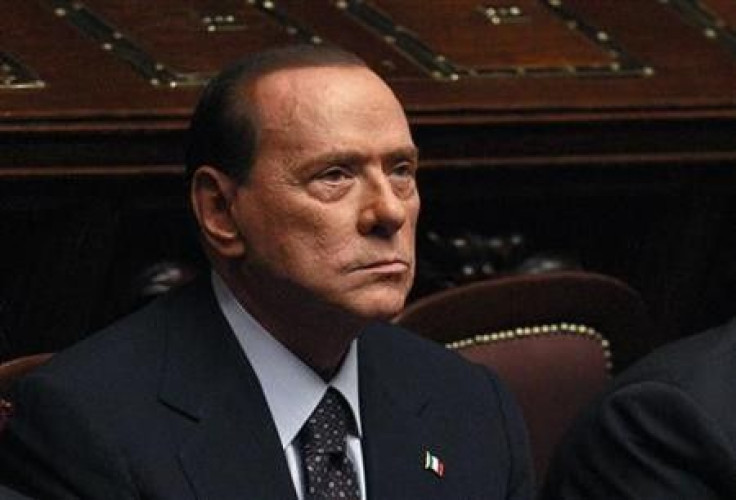Berlusconi resignation fails to convince markets

ROME (Reuters) - Prime Minister Silvio Berlusconi's pledge to resign after implementing economic reforms did nothing on Wednesday to staunch a perilous collapse in market confidence in Italy.
Financial markets have been clamoring for weeks for Berlusconi to depart because of his failure to push through painful austerity measures.
But after Berlusconi's announcement on Tuesday that he would step down, there were few signs of the swift appointment of a government capable of supervising reforms. Berlusconi said he expected an election would not take place until early 2012.
Yields on 10-year Italian debt soared above what is seen as the 'red line' of 7 percent and spreads between Italian government paper and German bunds also rose over another watershed of 500 basis points, reaching a record of above 560.
Analysts said Italy was now in territory where Greece, Ireland and Portugal were forced to seek bailouts.
Berlusconi said he envisaged an election taking place at the start of February, and that PDL party secretary and former justice minister Angelino Alfano would be the center-right's candidate for prime minister.
I will resign as soon as the (budget) law is passed and, since I believe there is no other majority possible, I see elections being held at the beginning of February and I will not be a candidate in them, he told La Stampa newspaper.
Italy is at the eye of the euro zone debt storm because, as the region's third largest economy, it is viewed as too big to bail out. Its travails therefore pose a threat to the survival of the single currency.
Giorgio Napolitano, the country's president who will be in charge of moves toward a new government, called for an immediate commitment to economic reforms to restore confidence on financial markets.
Italy's opposition said it wanted budget reforms to pass into law by November 14.
There are disagreements among the political parties both about the form of a new government and on budget and structural reforms promised to Europe to bring down Italy's huge debt and improve its economic prospects.
After failing to secure a majority in a vote in the lower house on Tuesday night, Berlusconi said he would quit as soon as parliament passed the budget reforms. On Wednesday he gave a string of interviews to dispel suspicions that the postponement of his resignation, which is very unusual in Italy, meant he would break his word.
We have to give Europe and the world an urgent, strong signal that we are taking things seriously, he told a morning television show by phone.
Berlusconi said he was opposed to any form of transitional or national unity government -- which the opposition and many on the financial markets favor -- and that an early election was the only alternative.
INSPECTORS
EU inspectors were in Rome on Wednesday to begin a monitoring mission aimed at ensuring economic reforms are carried out as part of an agreement reached at a G20 summit last week. Most of the reforms are incorporated in the budget measures to be voted on by parliament.
The European Commission sent a letter to Italy this week requesting more details on the reforms and saying additional measures would be needed to meet the target of balancing the budget by 2013.
Commentators said the fact that President Giorgio Napolitano had announced the resignation plan in an official statement would make if extremely difficult for Berlusconi to renege on his pledge to stand down.
Napolitano said he would start consultations with all political parties after the new budget measures were approved.
When a government is defeated or resigns, it is the president's duty to appoint a new leader to try to build a majority in parliament, or call an election.
Pier Luigi Bersani, leader of the opposition center-left Democratic Party, repeated a proposal to form a transitional government spanning the political spectrum.
Berlusconi and his closest allies say a government of technocrats would be an undemocratic coup against the 2008 election result.
(Additional reporting by Giselda Vagnoni and Stefano Bernabei, Philip Pullella, James Mackenzie and Catherine Hornby; Editing by Robert Woodward)
© Copyright Thomson Reuters 2024. All rights reserved.











